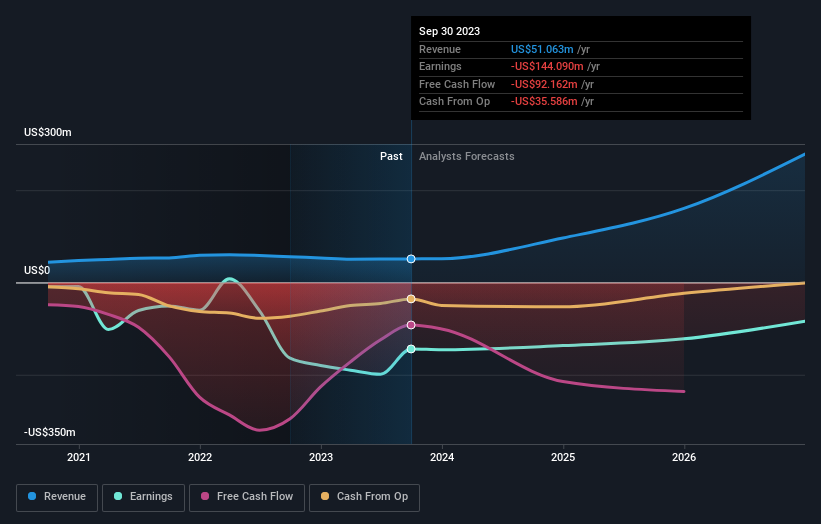While institutions invested in Danimer Scientific, Inc. (NYSE:DNMR) benefited from last week's 54% gain, individual investors stood to gain the most
Key Insights
The considerable ownership by individual investors in Danimer Scientific indicates that they collectively have a greater say in management and business strategy
A total of 25 investors have a majority stake in the company with 39% ownership
If you want to know who really controls Danimer Scientific, Inc. (NYSE:DNMR), then you'll have to look at the makeup of its share registry. And the group that holds the biggest piece of the pie are individual investors with 54% ownership. In other words, the group stands to gain the most (or lose the most) from their investment into the company.
Individual investors gained the most after market cap touched US$102m last week, while institutions who own 34% also benefitted.
Let's take a closer look to see what the different types of shareholders can tell us about Danimer Scientific.
Check out our latest analysis for Danimer Scientific
What Does The Institutional Ownership Tell Us About Danimer Scientific?
Institutional investors commonly compare their own returns to the returns of a commonly followed index. So they generally do consider buying larger companies that are included in the relevant benchmark index.
Danimer Scientific already has institutions on the share registry. Indeed, they own a respectable stake in the company. This suggests some credibility amongst professional investors. But we can't rely on that fact alone since institutions make bad investments sometimes, just like everyone does. When multiple institutions own a stock, there's always a risk that they are in a 'crowded trade'. When such a trade goes wrong, multiple parties may compete to sell stock fast. This risk is higher in a company without a history of growth. You can see Danimer Scientific's historic earnings and revenue below, but keep in mind there's always more to the story.
Danimer Scientific is not owned by hedge funds. The company's largest shareholder is BlackRock, Inc., with ownership of 6.1%. In comparison, the second and third largest shareholders hold about 4.9% and 4.2% of the stock. Stephen Croskrey, who is the third-largest shareholder, also happens to hold the title of Chairman of the Board.
Our studies suggest that the top 25 shareholders collectively control less than half of the company's shares, meaning that the company's shares are widely disseminated and there is no dominant shareholder.
Researching institutional ownership is a good way to gauge and filter a stock's expected performance. The same can be achieved by studying analyst sentiments. There are a reasonable number of analysts covering the stock, so it might be useful to find out their aggregate view on the future.
Insider Ownership Of Danimer Scientific
The definition of company insiders can be subjective and does vary between jurisdictions. Our data reflects individual insiders, capturing board members at the very least. Company management run the business, but the CEO will answer to the board, even if he or she is a member of it.
Insider ownership is positive when it signals leadership are thinking like the true owners of the company. However, high insider ownership can also give immense power to a small group within the company. This can be negative in some circumstances.
Our most recent data indicates that insiders own a reasonable proportion of Danimer Scientific, Inc.. Insiders own US$12m worth of shares in the US$102m company. We would say this shows alignment with shareholders, but it is worth noting that the company is still quite small; some insiders may have founded the business. You can click here to see if those insiders have been buying or selling.
General Public Ownership
The general public, who are usually individual investors, hold a substantial 54% stake in Danimer Scientific, suggesting it is a fairly popular stock. With this amount of ownership, retail investors can collectively play a role in decisions that affect shareholder returns, such as dividend policies and the appointment of directors. They can also exercise the power to vote on acquisitions or mergers that may not improve profitability.
Next Steps:
I find it very interesting to look at who exactly owns a company. But to truly gain insight, we need to consider other information, too. Like risks, for instance. Every company has them, and we've spotted 3 warning signs for Danimer Scientific (of which 2 don't sit too well with us!) you should know about.
But ultimately it is the future, not the past, that will determine how well the owners of this business will do. Therefore we think it advisable to take a look at this free report showing whether analysts are predicting a brighter future.
NB: Figures in this article are calculated using data from the last twelve months, which refer to the 12-month period ending on the last date of the month the financial statement is dated. This may not be consistent with full year annual report figures.
Have feedback on this article? Concerned about the content? Get in touch with us directly. Alternatively, email editorial-team (at) simplywallst.com.
This article by Simply Wall St is general in nature. We provide commentary based on historical data and analyst forecasts only using an unbiased methodology and our articles are not intended to be financial advice. It does not constitute a recommendation to buy or sell any stock, and does not take account of your objectives, or your financial situation. We aim to bring you long-term focused analysis driven by fundamental data. Note that our analysis may not factor in the latest price-sensitive company announcements or qualitative material. Simply Wall St has no position in any stocks mentioned.


